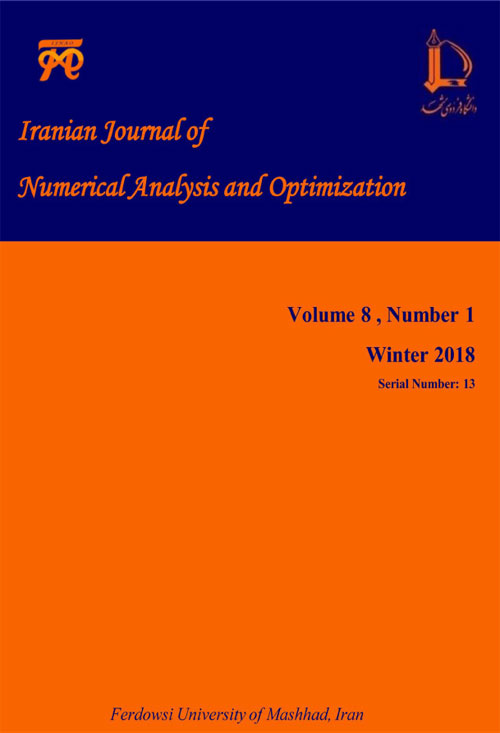فهرست مطالب

Iranian Journal of Numerical Analysis and Optimization
Volume:8 Issue: 1, Winter and Spring 2018
- 150 صفحه،
- تاریخ انتشار: 1397/01/20
- تعداد عناوین: 7
-
-
Pages 1-18In the present paper, we propose a method to solve a class of weakly singular Fredholm integral equations of the second kind in reproducing kernel spaces. The Taylor series of the unknown function is used to remove the singularity and bases of reproducing kernel spaces are used to solve this equation. Efficiency of the proposed method is investigated through various examples.Keywords: Weakly singular kernel, Fredholm integral equations, Taylor series, Reproducing kernel space.
-
Pages 19-40In this paper, we present a new derivative-free spectral residual method for solving large-scale systems of equations. Our algorithm is equipped with a dwindling multidimensional nonmonotone filter in which whose envelope is dwindling as the step-length of line search is decreasing. The proposed algorithm is also combined with a relaxed nonmonotone line search technique which allows the algorithm to enjoy the nonmonotone property from scratch. Under some standard assumptions, the global convergence property of the proposed algorithm is established. Numerical results on some test problems show the efficiency and effectiveness of the new algorithm in practice.Keywords: Dwindling filter technique, Systems of equations, Nonmonotone line search, Global convergence
-
Pages 41-62In this paper, a scheme is presented for approximating solutions of non linear degenerate parabolic equations which may contain discontinuous solutions. In the one-dimensional case, following the idea of the local discontinu ous Galerkin method, first the degenerate parabolic equation is considered as a nonlinear system of first order equations, and then this system is solved us ing a fifth-order finite difference weighted essentially nonoscillatory (WENO) method for conservation laws. This is the first time that the minmod-limiter combined with weighted essentially nonoscillatory procedure has been applied to the degenerate arabolic equations. Also, it is necessary to mention that the new scheme has fifth-order accuracy in smooth regions and second-order accuracy near singularities. The accuracy, robustness, and high-resolution properties of the new scheme are demonstrated in a variety of multidimen sional problems.Keywords: WENO schemes, Finite difference scheme, Multidimensional nonlinear degenerate parabolic equation, Porous medium equation.
-
Pages 63-80In this paper we present a new and efficient method by combining pseudo differential operators and Haar wavelet to solve the linear and nonlinear differential equations. The present method performs extremely well in terms of efficiency and simplicity.Keywords: Haar wavelet, Fourier transform, Differential equations, Numerical solution, Pseudo differential operators
-
Pages 81-110Solving constrained bimatrix games in the fuzzy environment is the aim of this research. This class of two-person nonzero-sum games is considered with finite strategies and fuzzy goals when some additional linear constraints are imposed on the strategies. We consider constrained two-person nonzero sum games with single and multiple payoffs. It is shown that an equilibrium solution of single-objective case can be characterized by solving a quadratic programming problem with linear constraints. Some mathematical program ming problems are also introduced to obtain the equilibrium points in multi objective case with crisp and fuzzy constraints. Finally, a political application of such games is presented which is about nuclear negotiations between two countries.Keywords: Multiobjective game, Constrained game, Fuzzy constrained game, Nuclear negotiations
-
Pages 111-128In this paper, in continuation of the construction of efficient numerical methods for stiff IVPs, we construct type two Nordsieck second derivative general linear methods with order p = s, where s is the number of internal stages, and stage order q = p. Implementation of the constructed methods with fixed and variable stepsize is discussed which verifies their efficiency.Keywords: Stiff differential equations, Nordsieck second derivative general linear methods, A-, L-stability, Variable stepsize implementation
-
Pages 129-141Assigning available resources to fire stations is a main task of fire depart ments administrator in a city. The importance of this problem increases when the number of available resources are inadequate. In this situation, the goal is to assign the limited available resources to fire stations such that the associated penalties of the shortages are minimized. Here, we first give a mathematical approach to consider some penalties for the shortage. Next, we give an integer program to minimize the sum of associated penalties. The proposed model can be used in many other problems arisen from health services, emergency management, and so on. We also propose a heuristic to efficiently solve the problem in a reasonable time. Our proposed heuristic has two phases. In the first phase, using a greedy approach, our proposed heuristic constructs a proper feasible solution. Next, in the second phase, we propose a local search to improve the quality of the solution constructed in the first phase. To show the efficiency of our proposed heuristic, we com pare our proposed heuristic with CPLEX based on the running time and the quality of obtained solutions on two groups of problems (real-word problems and randomly generated problems). The numerical results show that on the 80% of benchmark problems, the obtained solution is the same as CPLEXs solutions. Also, the running time of our proposed algorithm is almost 10 times better than CPLEXs running time, in average.Keywords: Resource assignment problem, Fire stations, Shortage, Integer programming, Heuristics

